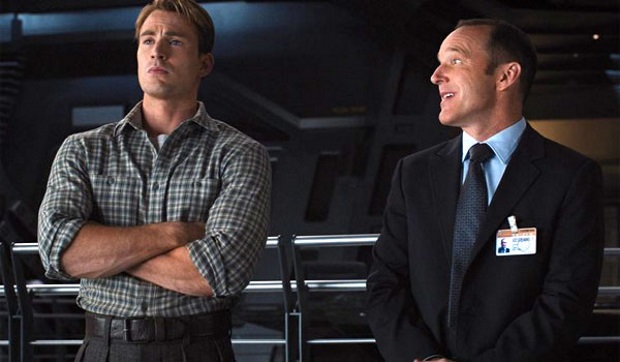Why We’ll Never See The Defenders in the Marvel Cinematic Universe
We should all make our peace with the idea that the Defenders will never meet the Avengers on the big screen, says James...
This article comes from Den of Geek UK.
We live in interesting times. Regardless of your personal interest in the Marvel Cinematic Universe and its stable of characters, you’d have to be a somewhat desperate contrarian to deny its place as perhaps the boldest narrative experiment cinema-goers have ever seen. Multiple interlinked movies spanning a decade-plus, sharing continuity and creative direction – it’s like nothing that has ever existed on the big screen.
Of course, if you believe Disney and Marvel, it isn’t just on the big screen – its tendrils also work their way onto television as well. As the stalwart MCU spin-off Agents Of SHIELD was keen to emphasise on its launch, #itsallconnected.
But is it really?
If it were all connected, why didn’t the Avengers intervene to save New York from the threat of The Hand as seen in The Defenders? Why hasn’t Nick Fury shown up on Matt Murdock and Luke Cage’s doorsteps asking for them to join the big leagues? Why hasn’t Iron Fist visited Doctor Strange to discuss the embarrassing cultural sensitivity issues their respective white saviour narratives have thrust upon them?
Such crossovers are common within the pages of comics, after all, and they’re the template for this whole enterprise. As it stands, crossovers broadly amount to little more than easter eggs, background references and increasingly contrived mentions – and always the TV referencing the movies, never the other way around.

As the “official” spin-off, Agents Of SHIELD gets the dubious honor of the most direct tie-ins to the movies, with a notable crossover with Captain America: The Winter Soldier in its first season and appearances from the likes of Lady Sif and Nick Fury orbiting its main star, Phil Coulson, the guy who died in Avengers then got better on TV (not that you’d notice if you were only watching the movies). The Netflix TV series, however, can’t even bring themselves to show Stark Tower in the New York skyline in case someone gets the idea that they can genuinely affect one another.
That in itself isn’t bad. On some level the Netflix shows especially work better in a universe where there aren’t other superheroes, and certainly not superheroes on the level of the Avengers. The more they talk about Iron Man, Thor and Captain America, the dumber it becomes that no-one ever thinks about getting in touch with them when the threats start to escalate.
Unfortunately, Marvel’s corporate structure doesn’t want the TV and movies to be separate, because the success of the movies drives people towards the TV shows, and that means more money for everyone. The sleight of hand trick they’ve had to perform over an increasing number of TV launches is to pretend that it’s all one grand, interconnected narrative when the reality is that we’ll never see those characters – potential cinematic headliners though they all are – in the movies.
Obviously, the word “never” comes with caveats. Circumstances alter, corporate owners sell up or move on, and creative minds change. But – barring anything seismic – this is the situation as it stands: The fundamental thing getting in the way of a unified Netflix-and-movies MCU team up, more than corporate politics, more than contracts and licensing, more than the creative forces at play – more, even, than the sheer disparity in audience sizes – is merchandising.

As fans of superhero movies, we prefer to ignore the fact that the MCU isn’t a creative experiment in its own right: it’s a vehicle for selling toys, t-shirts, and lunchboxes (or the modern digital equivalent). We might think that Daredevil hanging out with Spider-Man, Captain America and Doctor Strange is the natural end point of those characters existing in a shared universe, but it’s not. It’s the equivalent of Stoya turning up in an episode of Sesame Street. It wouldn’t take the Cookie Monster demonstrating why he’s called that for parents to find themselves being asked questions they’d rather not answer.
Because even if you sanded down the edges of the MCU Daredevil so that he could both keep his clothes on and not torture anyone for 5 minutes, the second he starts palling about with more reliably unit-shifting corporate IP there will be boys and girls out there deciding they’re now the biggest Daredevil fan on the planet. And those kids are going to bug their parents to let them watch Daredevil on Netflix. And those parents, whether out of ignorance, disinterest or confusion, are going to let them. And we all know that the Netflix shows aren’t suitable for kids, due to their graphic violence, frank sexual content and curiously gratuitous use of the word ‘shit’.
That’s the problem. These movies, cynically though this might frame it, are adverts. And the Netflix shows are not a product Marvel wants to advertise to kids. Until that changes, the crossover the universe keeps teasing can’t happen.
Now don’t get me wrong, I love Marvel’s movies and I’m at least interested enough in its TV output to watch most of it. But the idea the Defenders could meet the Avengers on the big screen under the current corporate climate is one we should all make our peace with.